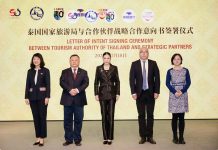Bangkok, July 27, 2012 – A broad-based destination image research study conducted across 14 countries by the Tourism Authority of Thailand has provided clear pointers on ways to sharpen the imagery and message of the country’s upcoming “Thainess” tourism campaigns.
Approved at the TAT’s annual Action Plan meeting in July 2012, the “Thainess” campaigns will highlight unique selling propositions such as Thai boxing, Thai cuisine, Thai health & wellness, Thai culture and heritage and many other such characteristics of the country’s identity.

Thailand has a broad range of products in each of these categories nationwide, and the TAT feels that they need to be given greater prominence as part of the marketing mix.
As all the categories of the “Thainess” campaigns lend themselves to powerful imagery, the research study was designed to identify the “trigger points” that will convince the potential visitors to move from “looking” to “booking.”
The countries included Malaysia, Japan, Taiwan, Hong Kong, United States, United Arab Emirates, Australia, China, South Korea, India, Russia, Germany, Sweden, and Italy. A total sample of 3,000 were surveyed including both those who were first time or repeat visitors.
The study used secondary and primary data and both quantitative and qualitative surveys. Interviews conducted included a broad cross-section of stakeholders, including Thais and foreigners, working both in and out of the industry.
TAT Governor Suraphon Svetasreni said, “The most important factor in the advertising message always has been the quality of the imagery. But with the many changes taking place these days, both the content and means of delivery of those images had to be re-examined within the context of our “Thainess” campaign strategies.”
He noted that some target groups felt attracted by a “story-telling” strategy. Others favoured a more static approach or responded to powerful images delivered via mobile devices. In all instances, the response differed depending on such factors as gender, age, location and the number of times the potential customers had visited Thailand.
“We found that some of the traditional perceptions of Thailand were still strong, such as those related to fun, excitement, good service, and hospitality,” Mr. Suraphon said. “This works well when trying to attract the family market, for example. Other images may need to be reinforced in other ways.
He added, “Altogether, it has been an interesting and challenging exercise. We became much more aware of how the world is changing and the constant need to keep up with these changes in order to maintain visitor flows.”




